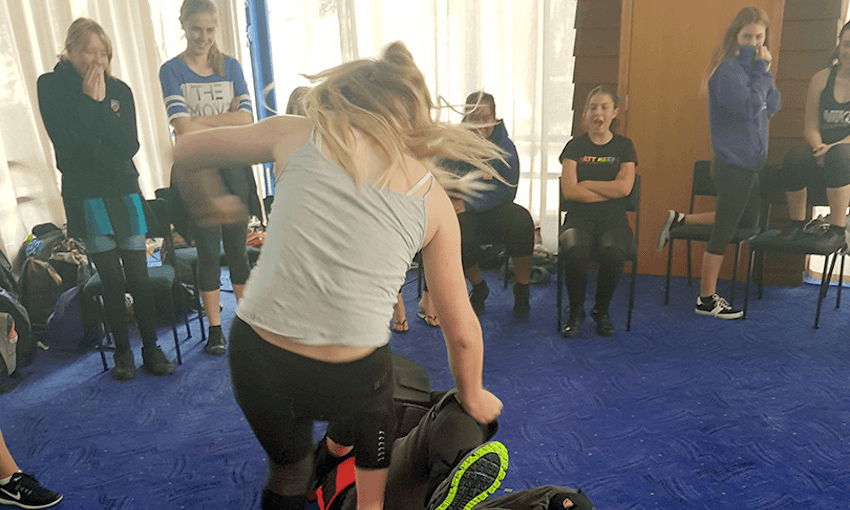An intensive self-defence and empowerment workshop puts young women in stressful roleplays of power dynamics and attempted assault. Don Rowe visits the Stand Up programme at Rodney College.
“You fucking bitch, I’ll kill you!”
Dragging the girl backwards, the armoured man ranted and raved, screaming obscenities as she squirmed and struggled. First she freed her arm. Then, even as she lashed back and forward, she swung her head back into his helmet with an audible thwack. With her free hand she struck at his groin again and again, punching and grabbing everything in reach.
When he relented and fell to the ground she followed his movements and punted him in the head, striking his back and his kidneys as he rolled away, before running to safety across the room. Instructor Phil Thompson, New Zealand’s most eminent self-defence expert, removed his helmet and looked at me with a ‘holy shit’ look on his face, nursing a bruised behind. The class applauded.
New Zealand has an almost unbelievably shameful record on gender relations and domestic and sexual violence. According to Rape Prevention Education, one in three women in New Zealand will experience an unwanted sexual experience by the age of 16. Up to one in five women will experience sexual assault as an adult and for Māori girls and women the likelihood of sexual violence is nearly twice as high as the general population. Of course, due to the nature of sexual violence and the low rates of reporting or conviction, it’s near impossible to truly assess the extent of the problem. But that doesn’t mean we can’t work to solve it.
When I arrived at a community hall north of Auckland for the second day of family violence programme Stand Up, class had broken for the morning as several survivors worked through the emotions that had surfaced during the first half of the day.
“This is why we’re doing it,” Thompson told me. “This is why this is so important. These girls are just one group of Year 10s, and look how many survivors we are working with. We know people are going to be triggered during the course because we know the statistics around this sort of thing.”
The key, he says, is in empowerment. Rape and sexual assault are about power and control, and so this aspect of the programme is geared towards reinforcing autonomy and bolstering the confidence of the girls across two days of theory and practical self defence. For the boys, who went through the programme two weeks earlier, it’s about being the fence at the top of the cliff than the ambulance at the bottom.
Murray Brett, who facilitates the programme on behalf of family violence network Te Rito Rodney, says his experience working with prisoners indicates that shock and awe tactics aren’t enough to win over young men.
“We have to come alongside them,” he says. “It’s about teaching them what a healthy relationship looks like, what consent means, before they end up in prison wishing something like this had existed for them.”
Thompson agrees.
“The workshops are polar opposites. Boys have different needs; we’re teaching boys about respect and consent. But the girls need to know what this looks like in order to be ready for it, and that can be an intense process.”
Because assault is scary. All the aikido wrist locks in the world will not prepare you for the reality of an aggressive attack, Thompson says, particularly when the aggressor is likely to be someone you know, someone whose behaviour you might expect to predict. It’s all very well telling girls to go for the eyes, says Thompson, but what does that actually mean in practice?
“You need to know how it’s going to feel so you can know what you need to do,” Thompson told the girls. “And you know what that is?”
“Flip the bitch switch!” they echoed.
And flip it they did. Thompson’s right pinky finger looks more like a stunted root vegetable than a dexterous appendage, courtesy of a previous student who went through the programme, and the crooked knuckles are a testament to the authenticity of the drills.
“This is for real,” he said. “When I say I want you to fight back, I mean it. She permanently damaged my finger, but that’s what it takes to teach you all how important this is. Any volunteers?”
There were.
“Are you going to use a lot of force?” asked one.
“Yes,” said Thompson, “because I need you to understand that what we’re doing works.”
Five minutes later he was on the floor.
How did you like it, I asked the volunteer.
“It was really scary at the start but then I just got one hit and I just felt I needed to kill him,” she laughed.
“I feel way more confident, and I know what it might feel like when the situation happens. I will be prepared.”
The Bulletin is The Spinoff’s acclaimed, free daily curated digest of all the most important stories from around New Zealand delivered directly to your inbox each morning.
